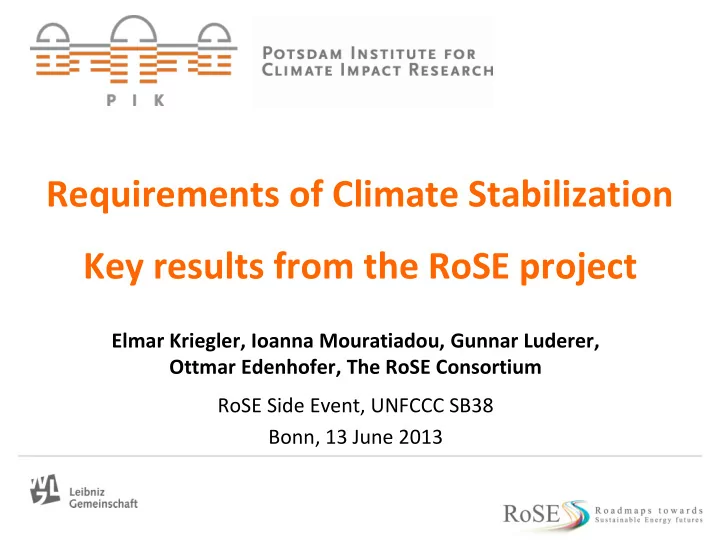

Requirements of Climate Stabilization Key results from the RoSE project Elmar Kriegler, Ioanna Mouratiadou, Gunnar Luderer, Ottmar Edenhofer, The RoSE Consortium RoSE Side Event, UNFCCC SB38 Bonn, 13 June 2013
Climate stabilization requires strong climate policy In the absence of climate policy and with current trends in energy intensity, energy demand and CO 2 emissions will increase with per capita income ~12 x current GWP ~8 x current GWP ~4 x current GWP Kriegler, Mouratiadou et al. (2013) Kriegler, Mouratiadou, Luderer, Edenhofer Potsdam Institute for Climate Impact Research
Climate stabilization requires strong climate policy Fossil fuel scarcity alone is not sufficient to reduce CO 2 emissions 69-73 ZJ 72-84 ZJ 54-61 ZJ 67-83 ZJ ca. 19 ZJ of fossil fuels burned until today ca. 36 ZJ of proven reserves today Kriegler, Mouratiadou et al. (2013) Kriegler, Mouratiadou, Luderer, Edenhofer Potsdam Institute for Climate Impact Research
Climate stabilization requires strong climate policy Emissions need to be phased out towards the end of the century (450 ppm) or in the first half of the 22nd century (550 pppm) Kriegler, Mouratiadou et al. (2013) Kriegler, Mouratiadou, Luderer, Edenhofer Potsdam Institute for Climate Impact Research
Climate stabilization requires strong global action Extrapolating current pledges does not lead to climate stabilization Results from the ReMIND model Baseline Fragmented Weak Policy Delay 2030 Delay 2020 Immediate Action Luderer et al. (2013) Kriegler, Mouratiadou, Luderer, Edenhofer Potsdam Institute for Climate Impact Research
Climate stabilization requires strong global action The later strong global action is enacted, the steeper midterm emissions reductions requirements for reaching the 2 o C target Results from the ReMIND model Baseline Fragmented Weak Policy Weak (until) 2030 Weak (until) 2020 Immediate Action Luderer et al. (2013) Kriegler, Mouratiadou, Luderer, Edenhofer Potsdam Institute for Climate Impact Research
Economic impact of later action Later action implies greater economic and institutional challenges for reaching 2 o C Luderer et al. (2013) Kriegler, Mouratiadou, Luderer, Edenhofer 7 Potsdam Institute for Climate Impact Research
Carbon prices and mitigation costs 2010-2100 • Estimates for „ idealized immediate global action scenarios “! • Only direct costs of climate mitigation. No benefits, co-benefits or adverse side-effects included Costs vary by 25-80% with economic growth and fossil fuel assumptions Costs approximately double from 550 to 450 ppm CO 2 e Kriegler, Mouratiadou, Luderer, Edenhofer 8 Potsdam Institute for Climate Impact Research
Mitigation strongly impacts fossil fuel markets Strong reduction of coal use Only moderate reduction of oil use (conventional reserves & resources are still being used) Climate mitigation effectively limits uncertainty about future fossil fuel use Bauer et al. (2013) Kriegler, Mouratiadou, Luderer, Edenhofer Potsdam Institute for Climate Impact Research
Mitigation strongly impacts fossil fuel markets Mitigation improves energy security by diversifying energy supply (Cherp et al., 2013) Mitigation reduces fossil fuel rents. This is overcompensated by the emerging carbon rent. Fossil fuel rent = (Price - Production costs) * Fuel; Carbon rent = CO 2 price * Emissions Results from the Bauer et al. (2013) 2010-2100, discounted at 5% ReMIND model Kriegler, Mouratiadou, Luderer, Edenhofer 10 Potsdam Institute for Climate Impact Research
Publications • RoSE work has been submitted to a special issue in Climate Change • Presented work synthesized from four papers: – Kriegler et al. (2013). Will economic growth and fossil fuel scarcity help or hinder climate stabilization? Overview of the RoSE multi-model study. – Luderer et al. (2013) Implications of weak near-term climate policies on long-term climate mitigation pathways – Bauer et al. (2013) Global fossil energy markets and climate change mitigation: An analysis with ReMIND. – Cherp et al. (2013) Evaluating energy security implications of different assumptions on economic growth, fossil fuel availability and climate mitigation. • Publication of the special issue anticipated in Fall or Winter 2013 • Publication of the RoSE model scenario database in Fall 2013 • Policy brief available For more information on the RoSE study: www.rose-project.org Funded by Kriegler, Mouratiadou, Luderer, Edenhofer Potsdam Institute for Climate Impact Research
Recommend
More recommend